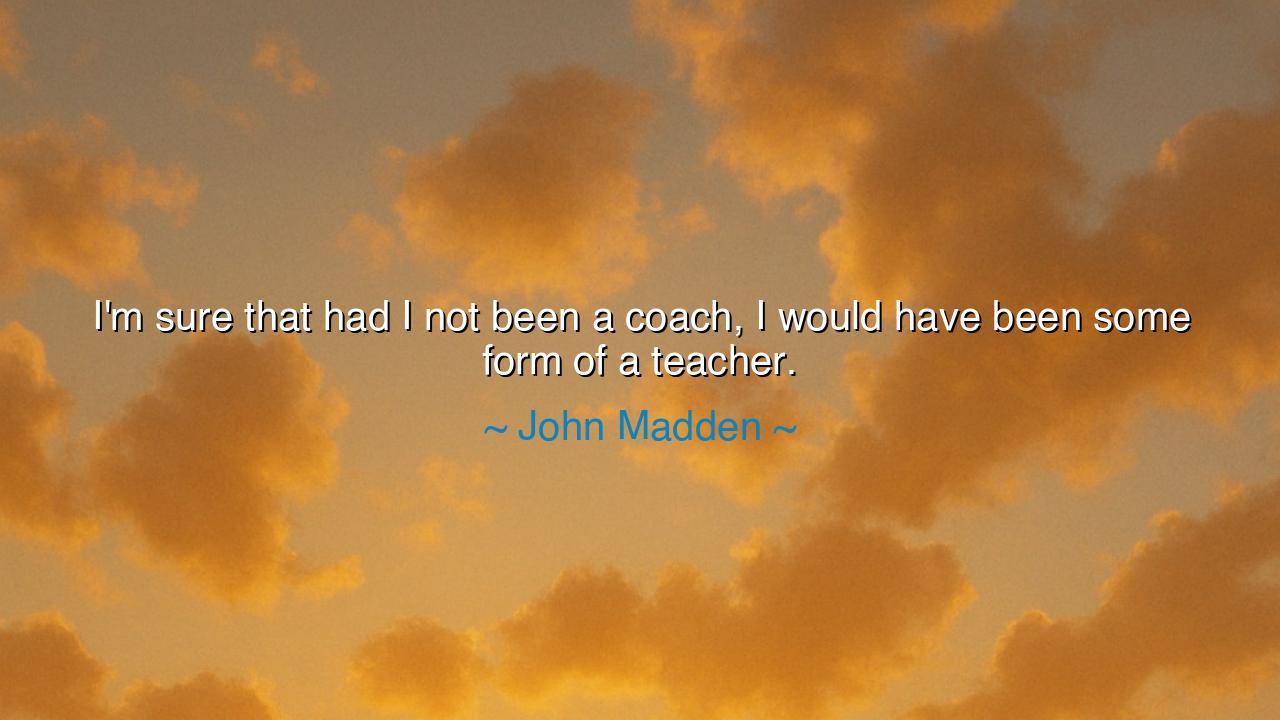
I'm sure that had I not been a coach, I would have been some






John Madden once declared: “I’m sure that had I not been a coach, I would have been some form of a teacher.” These words, though simple, unveil the soul of a man whose life was defined by the act of guiding others. For in his heart, Madden knew that both roles—coach and teacher—are bound by the same sacred duty: to pass on knowledge, to shape character, to draw out the best that lies hidden within another. He saw no difference in spirit between the field of play and the classroom of learning.
The origin of this thought lies in Madden’s life itself. Though he is remembered as one of the greatest football coaches and broadcasters of all time, his gift was never only strategy or analysis. His gift was teaching. He had the rare ability to take the complex and make it clear, to take the intimidating and make it accessible. Whether speaking to a lineman on the sideline or millions of fans through a television broadcast, Madden was always a teacher first—breaking down the game, inspiring others to see it with fresh eyes, and igniting a passion that carried far beyond the stadium.
The ancients, too, honored this bond between leadership and teaching. Plato’s Academy was not unlike a team, where the philosopher guided his students toward truth. Confucius gathered disciples around him, shaping not only their knowledge but their conduct. Even the generals of Rome were expected to be teachers of discipline and courage to their legions. Madden’s words resonate with this timeless understanding: that to teach is not confined to chalkboards or scrolls, but can be lived out wherever one leads others.
History gives us countless examples. Consider John Wooden, the legendary basketball coach at UCLA. Like Madden, Wooden never saw himself only as a coach of sport, but as a teacher of life. His players remembered not just his strategies but his “Pyramid of Success,” lessons about integrity, hard work, and humility that shaped their lives far beyond basketball. Or think of Socrates himself, who never called himself a teacher, yet through his questions coached men’s minds into greatness. Their lives prove the truth of Madden’s insight: the calling of a teacher wears many faces.
The meaning of Madden’s words also speaks to the humility of his spirit. Though he was a celebrity, an icon of American sport, he did not cling to the titles of fame. He chose instead the title of teacher, for he knew that the true measure of a life is not the trophies one collects but the lives one shapes. To be remembered as a teacher is to be remembered as a giver, not a taker—as one who planted seeds of wisdom and watched them grow in others.
The lesson for us is profound: whatever your station in life, you too are called to be a teacher. You may not stand in a classroom, you may not coach a team, but each of us has someone looking to us for guidance, for clarity, for inspiration. Children, colleagues, friends, even strangers—every day, in word and deed, we are teaching. The question is not whether we teach, but whether we teach well.
In practice, this means embracing patience, clarity, and generosity. Do not hoard knowledge—share it. Do not mock those who do not yet understand—guide them. When someone struggles, meet them where they are, as Madden did, and lift them step by step. Seek to be remembered not for your victories alone, but for the wisdom you left in others.
Therefore, hold fast to Madden’s wisdom: “Had I not been a coach, I would have been some form of a teacher.” Let it remind you that life’s greatest calling is not glory but guidance, not dominance but direction. For when the trophies rust and the cheers fade, the teachings endure—living on in the hearts of those you have touched, as eternal as the game itself.






AAdministratorAdministrator
Welcome, honored guests. Please leave a comment, we will respond soon